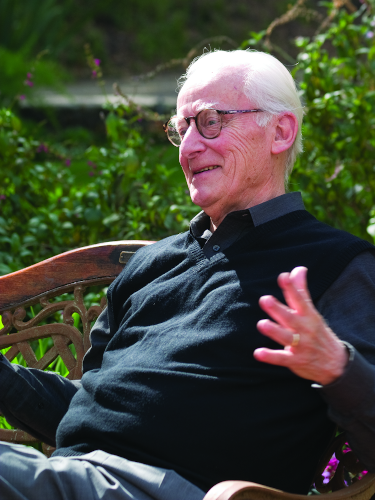
In the early hours of January 29, 2010, the morning following the Feast of St. Thomas Aquinas, the world lost one of its finest Thomistic philosophers. And Thomas Aquinas College lost one of its most loyal champions and dearest friends. Dr. Ralph McInerny — teacher, mentor, novelist, husband, father of 7, and grandfather of 17 — died at the age of 80 from esophageal cancer.
The director of the Jacques Maritain Center and the Medieval Institute at the University of Notre Dame, where he was also the Michael P. Grace Professor of Medieval Studies, Dr. McInerny was profoundly influential both in academia and in the broader culture. In the half-century since joining the Notre Dame faculty in 1955, he published more than two dozen scholarly books and edited an acclaimed series of translations of St. Thomas Aquinas’ commentaries. He also wrote more than 80 popular novels (most famously the Father Dowling and Andrew Broom mysteries), co-founded Crisis and Catholic Dossier magazines, and served on President George W. Bush’s Committee on the Arts and Humanities.
Dr. McInerny’s longtime relationship with Thomas Aquinas College was as multifaceted as was his career. Like the College’s founders, he was a student of the late Thomist Charles De Koninck at Université Laval in Québec. Later, he was an educator of the College’s tutors, 10 of whom — including late president Thomas E. Dillon,President Michael F. McLean , and Dean Brian Kelly — studied under his tutelage at Notre Dame. He was also an ardent backer of the College, speaking at Dr. Dillon’s inauguration in 1991 and serving on its Board of Governors for nine years. And he was a guiding light for its students, coming to campus regularly to deliver lectures, including, in the spring of 2009, when he presented the talks that he originally gave at the University of Glasgow in 1994-95 as part of the highly prestigious Gifford Lectures.
Upon retiring from the Board of Governors and becoming an emeritus member in 2002, Dr. McInerny remarked: “Short of the College of Cardinals, there is no college I hold in higher esteem than Thomas Aquinas. From its founding to its present flourishing, it has been truly a source of hope that young Catholics will see the life of the mind and the life of the spirit as two sides of the same coin. That hope has been fulfilled for decades. There is no stronger argument for Thomas Aquinas College than the magnificent young women and men who have graduated from there and as priests, religious, and laypeople spread the influence of their education through the nation.”
Of course, the admiration was entirely mutual. As tutor Dr. Gregory Froelich (’83), one of Dr. McInerny’s former graduate students, notes, “Ralph McInerny exemplified the virtue of discipleship, a rarity in modern academia. Whether attending daily Mass to ‘meet his maker,’ as he was fond of saying, or inspiring confidence in his students to learn directly from St. Thomas, Ralph cheerfully deflected attention away from himself to another mightier than he.”
In 1985, the College awarded Dr. McInerny its highest honor, the St. Thomas Aquinas Medallion, for his fidelity to the Church and his unfaltering work on Her behalf. Dr. McInerny had planned to attend the inauguration of new Thomas Aquinas College president Dr. Michael F. McLean in February, but as his former student and the College’s current dean, Dr. Kelly, observed, “the Good Lord had other plans.” Instead, Dr. McInerny’s successor as director of the Jacques Maritain Center, Dr. John P. O’Callaghan, came in his place and relayed that Dr. McInerny regarded the College as “one of the last, best hopes for genuine Catholic education in the U.S., indeed, perhaps anywhere.”
Dr. O’Callaghan also shared a heartening anecdote about Dr. McInerny’s final days: “Ralph, as you all know, was a writer, and a writer to the end he remained,” he said. “The day before he died, he asked for a piece of paper and scribbled on it, ‘I commend my soul to God.’ My own sister-in-law, hearing of it said, ‘It is perhaps the single most important thing he ever wrote.’”
(Thomas Aquinas College Newsletter, Spring 2010)







